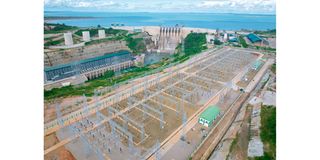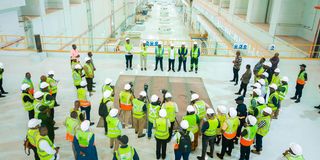Julius Nyerere Hydropower Project reaches major milestone with full turbine activation

An aerial view of the Julius Nyerere Hydro Power Project. A milesttone has been achieved after all the nine turbines were turned on to generate 2,115 megawatts of electricty
What you need to know:
- The milestone follows the successful completion and activation of the turbines, marking a significant leap in the nation’s power generation capacity.
Rufiji. All nine turbines at the Julius Nyerere Hydropower Project (JNHPP), collectively generating 2,115 megawatts, are now fully operational, the Deputy Prime Minister and Minister of Energy, Dr Doto Biteko has announced.
Dr Biteko revealed that the achievement that opens the door for further government investment in electricity transmission and distribution infrastructure, ensuring reliable power delivery to the economy.
The milestone follows the successful completion and activation of the turbines, marking a significant leap in the nation’s power generation capacity.
The project, with a cost of Sh6.5 trillion, has had 99.5 percent of its total funding already paid by the government.
Dr Biteko provided these updates during an inspection on Saturday, April 5, 2025, accompanied by other ministers.

Deputy PM and Minister for Energy Dotto Biteko (third from left) listens to a briefing during his visit to the JNHPP on Saturday, April 5.
He noted that the first turbine was turned on in February 2024, and all turbines, each producing 235 megawatts, are now fully operational.
Dr Biteko also highlighted that the sixth-phase government inherited the project when it was only 30 percent complete.
Furthermore, he said arrangements are afoot to invite President Samia Suluhu Hassan for the official project inauguration.
Egypt has confirmed its head of state will attend the inauguration, with the event schedule being finalised.
“It is a great joy that all the machines are operational and generating power. The dream of harnessing electricity from this dam has come true, and power is now available,” said Dr Biteko.
With the nation’s power production capacity increased, the government is in final discussions with Zambia to begin exporting electricity.
A transmission line is currently under construction, with Zambia also building its section, paving the way for energy trade between the two nations.
Dr Biteko added that the government is now focusing on expanding the electricity transmission infrastructure to benefit more Tanzanians.
Minister of State in the Vice President’s Office (Union and Environment), Mr Hamad Masauni, described the project's completion as a miracle, considering its scale.
Acknowledging the project's reliance on water, he noted that his ministry is collaborating with other sectors to mitigate climate change impacts that could affect water sources.
“We will continue working with all ministries to protect water sources so that the project remains unaffected in the future,” he said.
Mr Masauni also pointed out that climate change presents opportunities for carbon trading, and the government is working with relevant authorities to ensure that citizens benefit from this.
Minister of State in the President’s Office (Planning and Investment), Prof Kitila Mkumbo, said the achievement demonstrates the country's economic independence.
He stressed that self-reliance in electricity is crucial for economic independence, and completing the project is a significant step towards that goal.
Prof Mkumbo further highlighted that 99.5 percent of the project’s funding came from domestic revenue, fulfilling the late Mwalimu Julius Nyerere’s vision of making Tanzania energy self-reliant.





